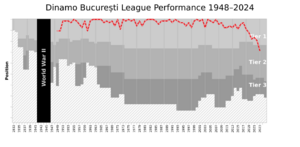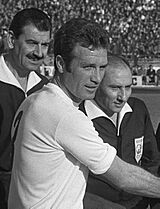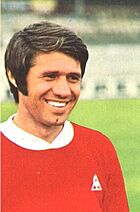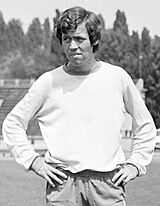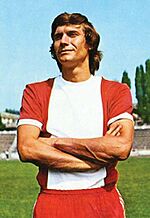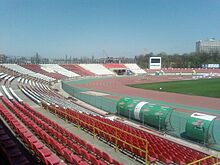FC Dinamo București facts for kids
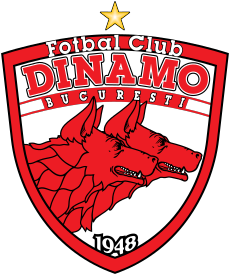 |
||||
| Full name | SC Dinamo 1948 SA | |||
|---|---|---|---|---|
| Nickname(s) |
|
|||
| Short name | Dinamo | |||
| Founded | 14 May 1948 | |||
| Ground | Arcul de Triumf | |||
| Capacity | 8,207 | |||
| Owners | Red&White Management (80.77%) DDB Supporters Association (12.06%) ACS FC Dinamo București (7.03%) Dinamo Socios (0.03%) Lotus Perfect Products SRL (0.01%) |
|||
| Chairman | Andrei Nicolescu | |||
| Head coach | Željko Kopić | |||
| League | Liga I | |||
| 2024–25 | Liga I, 6th of 16 | |||
|
||||
FC Dinamo București, often called Dinamo București or just Dinamo, is a professional football club from Bucharest, Romania. They play in Liga I, which is the top football league in Romania.
The club was started in 1948. It was formed by combining two other teams, Unirea Tricolor and Ciocanul. Dinamo București has almost always played in Romania's top league. They are one of the most successful clubs in the country. They have won 18 Liga I titles, 13 Cupa României (Romanian Cup), two Supercupa României (Supercup), and one Cupa Ligii (League Cup).
In the 1983–84 season, Dinamo made history. They became the first Romanian club to reach the semi-finals of the European Cup. They were eventually knocked out by Liverpool.
Dinamo București's team colours are white and red. Their home stadium is Stadionul Dinamo. However, for big matches, they sometimes play at Arena Națională. Currently, they are playing at Stadionul Arcul de Triumf while their main stadium is being rebuilt. Their biggest rivals are FCSB, and their matches are known as "the Eternal Derby." They also have rivalries with Rapid București and Universitatea Craiova.
Contents
Club History: From Founding to Today
How Dinamo București Started (1948–1955)
Dinamo București was founded on May 14, 1948. It was created by merging two teams, "Unirea Tricolor MAI" and "Ciocanul București." The new club represented the Ministry of Internal Affairs.
At first, Dinamo had two teams: "Dinamo A" (Ciocanul) and "Dinamo B" (Unirea Tricolor MAI). Dinamo B later moved to other cities and became a different club. The name "Dinamo" was first used on May 1, 1948.
Dinamo played its first international match on July 11, 1948. They won 4–1 against SK Židenice from Czechoslovakia. On August 22, Dinamo București played its first game in the top national league. Some of the early players included Titus Ozon and Lăzăreanu.
In 1955, Dinamo won its first championship title. This was a big moment for the club. The team had a strong attack and a solid defense.
In the fall of 1956, Dinamo became the first Romanian club to play in the European Cup. They won their first game against Galatasaray 3–1.
Winning Titles and European Adventures (1950–1981)
Dinamo won its second championship in 1962. They had talented players like Datcu and I. Nunweiller. The club won its third title in 1963.
In the 1963–64 season, Dinamo won both the league and the Romanian Cup. They beat their rivals Steaua 5–3 in the Cup final. In the 1963–64 European Cup, Dinamo played against the famous Real Madrid. The game in Bucharest set a new record with 100,000 fans watching.
Dinamo won its fourth league title in a row in 1965. They had new stars like Mircea Lucescu. The club won its sixth title in 1971. Two years later, in 1973, they won their seventh title.
In the 1973–74 European Cup, Dinamo had a huge 11–0 home win against Crusaders Belfast. This is still the biggest win in the history of the European Cup.
The Red Dogs won their eighth title in the 1974–75 season. Dudu Georgescu was a top scorer, winning his first 'Golden Boot' award. The team won its ninth title in the 1976–77 season, and Georgescu won his second 'Golden Boot'.
The Golden Era (1981–1992)
The 1980s were a very successful time for Dinamo. In 1982, they won their tenth national title and the Cup. They won their eleventh title in 1983.
The 1983–84 season was a highlight. Dinamo reached the semi-finals of the European Cup. They beat strong teams like Hamburger SV and Dinamo Minsk. This made them the first Romanian team to reach this stage. They lost to Liverpool in the semi-finals.
In 1986, Dinamo won the Cup against Steaua. In 1990, Dinamo won another national title, their 13th. They also won the Cup final against Steaua. In 1992, Dinamo won its 14th title. This season was special because they played 34 matches without any defeats.
Challenges and Comebacks (1992–2017)
After their golden era, Dinamo faced some challenges. They continued to play in the UEFA Cup but didn't achieve major European results. New players like Catalin Hildan, Florentin Petre, and Cosmin Contra joined the team.
In the 1999–2000 season, Dinamo won the league title again. They also won the Romanian Cup in 2003. In the UEFA Cup 2003–04 season, they beat Shakhtar Donetsk. Dinamo won the Romanian League title in 2004, beating FCSB. They also won the Romanian Cup that year.
In the UEFA Cup 2005–06 season, Dinamo had a memorable 5–1 win against English club Everton. They also beat CSKA Moscow, who were the Cup holders.
In the 2006–07 season, Dinamo won its 18th league title. They were champions with four games left to play.
In 2013, Ionuț Negoiță bought the club. In May 2014, the club started a process called insolvency. This meant they had financial difficulties. Because of this, Dinamo could not play in the Europa League, even when they finished high in the league. In 2015, the club ended its insolvency process. In the 2016–17 Liga I season, Dinamo finished third and qualified for the Europa League. However, they were eliminated by Athletic Bilbao.
Recent Times and Relegation (2017–Present)
Dinamo faced tough times in recent years. They struggled to reach the top part of the league. In 2020, the club was bought by a Spanish company. They signed new players with high salaries. However, the new owner did not pay the players for several months. This led to many players leaving and the club facing huge debts.
In the 2021–22 season, Dinamo was relegated to Liga II for the first time in its history. This was a very sad moment for the club and its fans.
In 2022, new owners, Red&White Management, took over the club. They worked hard to improve the team. In 2023, Dinamo won a promotion play-off against Argeș Pitești. They won with a total score of 8–5 over two games. This victory brought Dinamo back to Liga I after only one season in Liga II.
Team Colours and Crest
Dinamo's main colours are red and white. The club's crest (logo) shows the profile of two red dogs. It also has a gold star above them. This star represents the club's tenth league title, which is a big achievement.
Home Stadium
Dinamo plays its home games at Stadionul Dinamo. This stadium opened on October 14, 1951. It was designed to hold 16,000 people, but with seats, its capacity is now 15,032. The stadium is part of a larger sports complex. This complex includes a smaller stadium, a sports hall, and a swimming pool.
Fans often call the stadium "Groapa" (The Pit). This is because it was built by digging down, rather than building tall stands. The North stand is named Peluza Cătălin Hîldan. This is in honour of a former Dinamo player who sadly passed away in 2000 at age 24.
For important matches, like against rivals FCSB, Dinamo plays at Arena Națională. Since 2022, the team has been playing its home matches at the new Stadionul Arcul de Triumf. This is because their traditional stadium is being rebuilt to meet modern league standards.
Fan Support
Dinamo has many fans across Romania. They are the second most supported club in the country. Most of their fans are in Bucharest, especially in the northeast and central areas. They also have many supporters in other parts of Romania and wherever Romanians live.
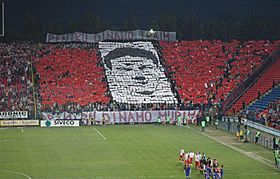
The club's most passionate fans are called "ultras." Their movement started in 1995. After the death of former captain Cătălin Hîldan in 2000, the North End of Dinamo's stadium was renamed Peluza Catalin Hîldan (PCH Stand) in his memory. Most supporters gather in the PCH.
Rivalries and Friendships
Dinamo has a very strong rivalry with FCSB. Their matches are known as the "Eternal Derby." These games are very intense for both sets of fans.
Dinamo's second biggest rivalry is with Rapid București. In the 1990s, these two clubs often competed closely for the championship title.
Another rivalry is with Universitatea Craiova. This rivalry began in 1973 when Dinamo won the league title over Craiova due to a better goal difference.
Dinamo's fans have a good friendship with the fans of Universitatea Cluj. This friendship started in the mid-1990s. They also have an unofficial friendship with Serbian club Crvena Zvezda.
Youth Program
Dinamo has a strong program for training young football players. This program helps develop new talent and encourages interest in the sport. The youth center has nine age groups, from nine to 18 years old. Dinamo has about 180 young players in its academy.
All these youth groups play in competitions organized by the Bucharest Football Association and the Romanian Federation. Older players, around 16–18 years old, can move up to the second team, Dinamo II.
The youth center is located at the Dinamo Sports Center. It has many training fields, dressing rooms, a medical center, and equipment storage.
Club Achievements
Domestic Titles
- Divizia A / Liga I
- Champions (18): 1955, 1961–62, 1962–63, 1963–64, 1964–65, 1970–71, 1972–73, 1974–75, 1976–77, 1981–82, 1982–83, 1983–84, 1989–90, 1991–92, 1999–2000, 2001–02, 2003–04, 2006–07
- Cupa României
- Winners (13): 1958–59, 1963–64, 1967–68, 1981–82, 1983–84, 1985–86, 1989–90, 1999–2000, 2000–01, 2002–03, 2003–04, 2004–05, 2011–12
- Cupa Ligii
- Winners (1): 2016–17
- Supercupa României
- Winners (2): 2005, 2012
Continental Achievements
- European Cup
- Semi-finalists (1): 1983–84
- Cup Winners' Cup
- Semi-finalists (1): 1989–90
Current Players
First-team squad
|
|
Players on Loan
|
|
Retired Jersey Numbers
|
Club Management
Team Statistics and Records
European Competitions History
Updated 3 August 2017.
| Competition | S | P | W | D | L | GF | GA | GD |
|---|---|---|---|---|---|---|---|---|
| UEFA Champions League / European Cup | 18 | 66 | 24 | 10 | 32 | 96 | 106 | –10 |
| UEFA Cup Winners' Cup / European Cup Winners' Cup | 5 | 20 | 8 | 4 | 8 | 25 | 18 | +7 |
| UEFA Europa League / UEFA Cup | 23 | 90 | 37 | 14 | 39 | 147 | 127 | +20 |
| UEFA Intertoto Cup | 1 | 4 | 1 | 0 | 3 | 4 | 6 | –2 |
| Total | 47 | 180 | 70 | 28 | 82 | 272 | 257 | +15 |
Key Records for Dinamo București:
- Most consecutive wins: 17 games (June 12, 1988 – November 27, 1988)
- Longest unbeaten streak: 47 games (May 26, 1991 – September 20, 1992)
- Player with most games played:
 Cornel Dinu (454 appearances)
Cornel Dinu (454 appearances) - All-time top scorer:
 Dudu Georgescu (207 goals)
Dudu Georgescu (207 goals) - Player with most international game appearances:
 Claudiu Niculescu (43 games)
Claudiu Niculescu (43 games) - Top scorer in international games:
 Claudiu Niculescu (18 goals)
Claudiu Niculescu (18 goals)
European Competition Records:
- Biggest home win: Dinamo 11–0
 Crusaders F.C. (1973–74). This is still the biggest win in European Cup history!
Crusaders F.C. (1973–74). This is still the biggest win in European Cup history! - Biggest away win:
 Alki Larnaca F.C. 0–9 Dinamo (1979–80)
Alki Larnaca F.C. 0–9 Dinamo (1979–80) - Heaviest home defeat: Dinamo 0–3
 Feyenoord (1971–72), Dinamo 0–3
Feyenoord (1971–72), Dinamo 0–3  Galatasaray (2009–10)
Galatasaray (2009–10) - Heaviest away defeat:
 PFC CSKA Sofia 8–1 Dinamo (1956–57)
PFC CSKA Sofia 8–1 Dinamo (1956–57)
Famous Former Players
Cornel Dinu holds the record for most appearances for Dinamo. He played 454 games between 1966 and 1983. Ionel Dănciulescu is second with 355 games.
Famous Former Coaches
Nicolae Dumitru is the most successful coach in Dinamo's history. He won five league titles and two Romanian Cups. Ioan Andone also won five trophies for Dinamo. He won one league title, three Romanian Cups, and one Supercup.
See also
 In Spanish: Fotbal Club Dinamo de Bucarest para niños
In Spanish: Fotbal Club Dinamo de Bucarest para niños
 | Lonnie Johnson |
 | Granville Woods |
 | Lewis Howard Latimer |
 | James West |


